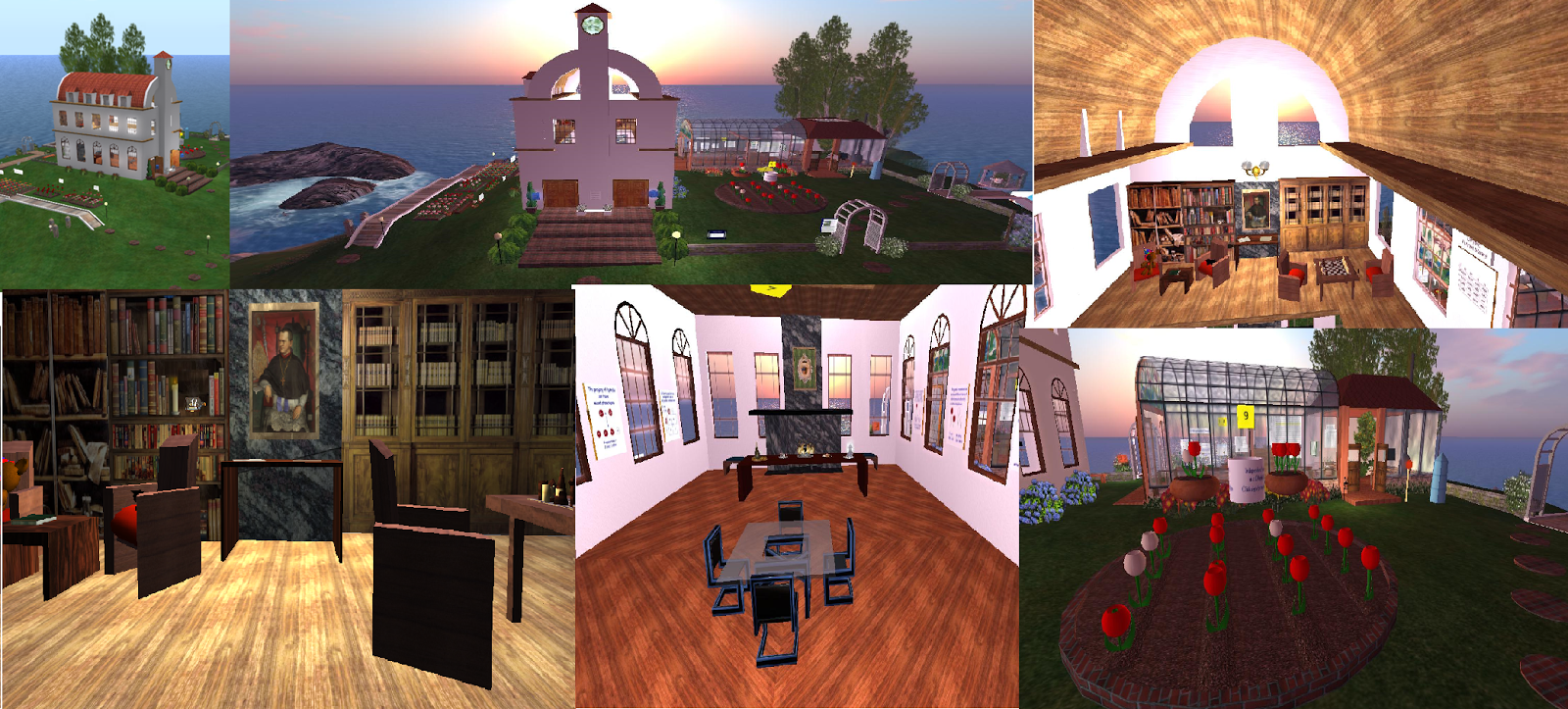Legend: Max Chatnoir and molecules background
I had the
pleasure of interviewing Max Chatnoir, a distinguished Professor of Biology in
Texas Wesleyan. She is the “deity” responsible for the creation of the world
Genome Island. The build is dedicated to the study of genetics. The island was
designed to support genetics classes for university undergraduates studying
biology, but anybody interested in science is welcome to participate.
Visitors have
access to highly experienced author information, interactive microscopes, a giant cell model, virtual experiments and
variety of topics about inheritance. You will
observe methodological objects related to Mendel's life and work and vast
information in note cards about genetic
information.
Max has made
presentations about Genome Island and its use for teaching genetics at
conferences sponsored by VWBPE (Virtual Worlds Best Practice in Education)
Educause and the Texas Blackboard Users Group.
In Second Life she presented the opportunity to build virtual
laboratories in which on line students could perform experiments and data
analysis.
In this interview, Max Chatnoir shares with us her
valuable experience as a teacher in a virtual classroom and interactive 3D
laboratory with relevant information provided.
Although we discussed some of these topics, I would not regard them as
special interests of mine, nor do I have any particular expertise in them. I think it is simplest just to cut this
statement.
Bimala Tagore: More than five years have passed after you decided to create Genome
Island. How do you evaluate your project?
Max Chatnoir: I think that virtual worlds like this one are a
wonderful place for learning. You have the advantage of personal contact
with another thinking human, via the avatars, but you don't have to be
physically in the same place. They can ask whatever questions they have and if
I'm not here, they can just IM me, and they'll get an answer the next time I
come in. it's a nice combination of personal interaction with the convenience
of working online. I wish I could use it for the majors, but they have to
actually work with real equipment and organisms if they are going to be
scientists. It's my favorite place to teach general education courses. Science
for non-majors. The students also seem to find it interesting. I teach my
nonmajors course here every fall and sometimes, if we have a bad weather day, I
may bring the majors in for a substitute lab. We did a three-point-test cross
here once when the flies didn't come in.
Bimala Tagore: The hard path is easier when you
strive to learn. I have attained some insight about cell and study of genetics
in Genome Island, interactive laboratory environment. What is it about science
that interests you the most?
Max Chatnoir: What interests me most is that there is always
something new and interesting happening. A new genome gets sequenced, or a new
gene is discovered. I always point out to the research students, that no matter
what their basic project is, they are doing some kind of genetic analysis. I
think one of the exciting areas of contemporary genetics is bioinformatics,
which is why I have several bioinformatics activities up on the Bioinformatics
platform. Comparing genomes and comparing similar genes in different species. We
know that our genes didn't originate with us, but we usually don't stop to
think that most of them didn't originate with us as a species. Our genes
are older than we are. A lot of bioinformatics has to do with constructing and
studying the information provided in DNA and protein databases. Every time a
new genome is sequenced, the information goes into those databases. To learn
about what makes us, it's helpful to see what we do and don't share with other
species.
Bimala Tagore: Impressive application of biological
information. Does genes determine the way of how
we could react to our world and even how our mind could interpret the
existence?
Max Chatnoir: I do think that genes have something to do with
how we experience the world and react to it. Genes encode hormones and
receptors and neurotransmitters and their receptors and a lot of molecules
relevant to behavior. But it's not all genetics. Experience counts too in my
opinion. For example, my sister and I didn't really grow up together because
she is much younger. I was finishing college before she started high
school. But it's amazing how similar our preferences are. We order the same
thing in restaurants and like the same kinds of fragrances, even though we
spend very little time together- Got to be some genetics in there.
The great thing
about the human mind is that we don't just behave thoughtlessly, but that is
overlaid on what is sometimes called the lizard brain. And I'm not a behavioral
geneticist, so I'm not speaking as an expert here. But our minds are a whole
additional informational layer laid over our basic biology. It's like a
separate genetic code that is better developed in us than in anything else.
Bimala Tagore: Plenty of interesting subjects. Some scientists and
doctors have devoted their entire lives with the study of life and living
organisms. You have the “Abbey”
and “Gardens” on your “sim”. It is a tribute to Augustinian abbot Gregor
Mendel. Why is it so important to become acquainted with
Mendel?
Max Chatnoir: Mendel was the first person to articulate the
"rules of inheritance" for sexually reproducing species. The amazing
thing was that he had no idea what a gene might be. He just followed the
inheritance patterns. The name "gene" wasn't even in use in his time.
He just called them "elements." Other people had done crosses
similar to those Mendel did, but he was the first to offer an interpretation.
Each parent provided an "element" for each of their traits. And that
the offspring got one from each parent. For Mendel's traits, one of the two
parental traits was always dominant to the other (but that isn't always the
case); that the parental elements sorted
into the gametes at random and with equal probability. He did the mathematical
analysis, and probably nobody could follow his argument at the time he first
presented it. Yes, doing the mathematical analysis was unusual for biology.
Although William Harvey had done something similar to prove that the blood HAD
to be circulating. It couldn't just be made and destroyed all the time -- there
was too much of it moving around. But most of biology was natural history.
Like Darwin was doing collection, describing, classifying. If Darwin and
Mendel could have got together, they would have been a Force! But they didn't.
However, they were roughly contemporary.
Bimala Tagore: Your explanation about Mendel’s positions as founder of
genetics is pretty relevant. On the other hand, leading this interview toward
ethics aspects, there are numerous thorny sides of genetic research that may
lead to ethical and social quandaries. Gene therapy could lead to a dark side.
What is your opinion in this respect?
Max Chatnoir: Sure it could. Imagine if we did start making
"designer babies. Think of the social inequity, even assuming that all of
the biology worked as we anticipated? And it won't. Do we really know enough
about ourselves to design whatever we might think an ideal human is?
We can discover
a lot about fruit fly behavior, because we don't agonize over the death of a
fruit fly, but we can't do that with humans. So we have to depend on the
"accidental experiments" of nature. And I'm not sure that even that
is very nice.
Bimala Tagore: Regrettably,
polemics about ethics are crucial. For this reason, genetics research
information should always be open to frank human dialogue and Genome
Island can communicate to non-expert too.
Max Chatnoir: I think that it can help with what the average citizen
needs to understand about science and scientific thinking. Everybody doesn't
need to know how to run a centrifuge, but everybody should be able to
understand a scientific argument.
Bimala Tagore: I really appreciate the opportunity for this stimulating
interview. Thank you very much.
Max Chatnoir: My pleasure
More information:
Visit Genome Island:
http://maps.secondlife.com/secondlife/Genome/121/145/53
























































0 comments:
Post a Comment
Comments will be reviewed and posted within 24 hours. Please note any abusive content or outside promotional links may not be approved.